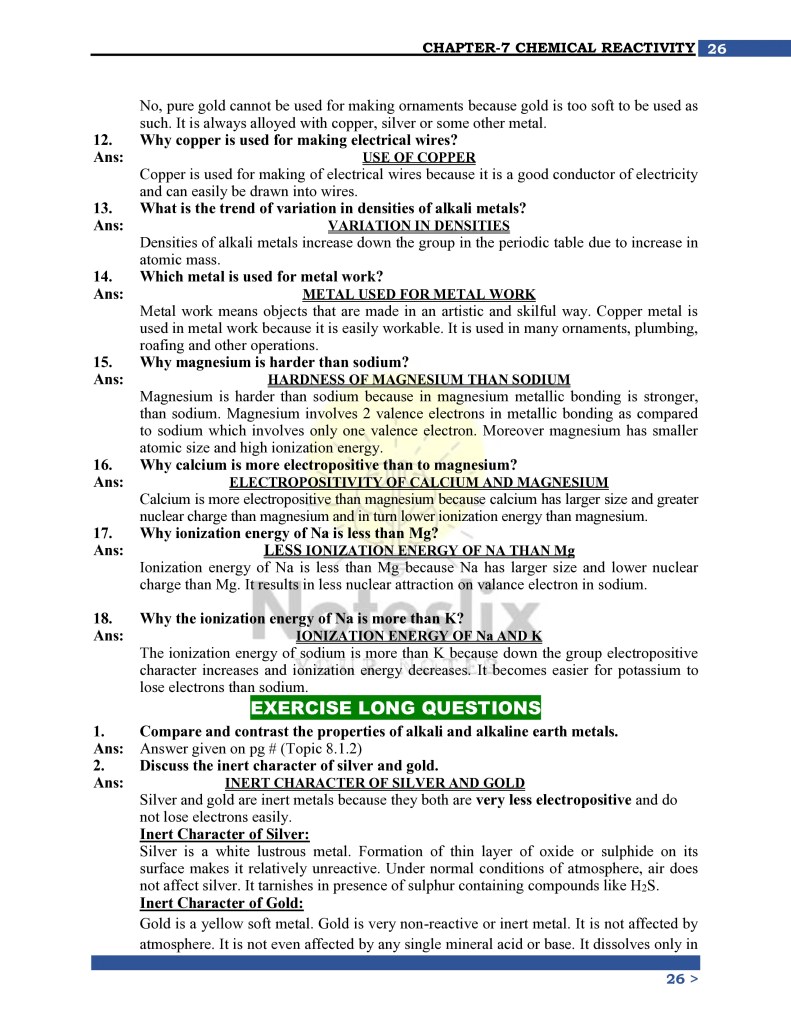Chemistry is often perceived as a challenging subject, but the right resources can transform it into an enjoyable learning experience. Chapter 8 of Class 9th Chemistry is a cornerstone of understanding chemical principles, filled with concepts that lay the groundwork for advanced studies.
This article covers key highlights of Chapter 8, covering exercises like MCQs, short questions, and long questions to assist students in excelling in their exams.







What is Covered in These Notes?
These notes comprehensively cover all major aspects of Chapter 8. The exercises included in the notes consist of multiple-choice questions (MCQs), short questions, and long questions.
Here’s a brief overview of what these notes offer:
- Multiple Choice Questions (MCQs): Enhance quick decision-making and understanding of core concepts.
- Short Questions: Focus on precise explanations of key topics.
- Long Questions: Involve detailed answers that integrate theory with examples.
Chapter 8 Exercise: MCQs, Short Questions, and Long Questions
The exercise section is meticulously designed to target every key area of Chapter 8. Below are the details:
- MCQs Section:
- MCQs are a vital component for mastering foundational knowledge. Examples include identifying chemical properties, applications of metals and non-metals, and reactivity patterns.
- For instance:
“Which one of the following is the lightest metal?” Options: (A) Calcium, (B) Magnesium, (C) Lithium, (D) Sodium.
- Short Questions:
- These questions help refine a student’s ability to provide concise yet complete answers.
- Example: “Why is sodium considered highly reactive?”
- Long Questions:
- The long-answer section challenges students to demonstrate a deeper understanding of concepts. These include explaining chemical reactivity trends or comparing physical properties of metals and non-metals.
Tool for Success in Exams
The notes are not just an academic tool but a stepping stone to achieving excellent results. The structured format ensures:
- Comprehensive Learning: By covering all aspects of Chapter 8.
- Focused Preparation: With exercises that mimic actual exam scenarios.
- Time Management Skills: Practicing MCQs and short questions helps manage time during exams.
Colored Notes
Visual appeal and clarity are crucial for effective learning. The notes for Chapter 8 come with color-coded sections, helping students distinguish between different types of content. For example:
- Key Definitions: Highlighted in bold or different colors for quick reference.
- Equations and Reactions: Presented in distinct colors to stand out.
- Important Points: Marked in boxes or underlined to emphasize their significance.
This color-coded approach makes revision more engaging and allows students to quickly locate crucial information.
Notes Are Free to Use
One of the standout features of these notes is their accessibility. These notes are available free of cost, ensuring that every student, regardless of their financial situation, can benefit from high-quality learning resources.
By removing financial barriers, these notes aim to promote equal opportunities for academic success.
Notes Are Mistake-Free
Accuracy is paramount when it comes to educational content. These notes are meticulously reviewed to ensure they are free from errors.
Whether it’s the theoretical content, solved numericals, or multiple-choice questions, every detail is checked to eliminate mistakes. Students can rely on these notes for authentic and error-free material that aligns with their curriculum.
Conclusion
Chapter 8 of Class 9th Chemistry is a crucial chapter that lays the foundation for understanding metals, non-metals, and their properties. The comprehensive notes provided for this chapter include MCQs, short questions, and long questions to ensure students have a holistic understanding of the subject.
With features like free access, colored formatting, and error-free content, these notes serve as an indispensable tool for exam preparation and beyond.
Other Chapters Exercises
- Class 9th Chemistry Chapter 2 Exercise
- Class 9th Chemistry Chapter 3 Exercise
- Class 9th Chemistry Chapter 4 Exercise
- Class 9th Chemistry Chapter 5 Exercise
- Class 9th Chemistry Chapter 6 Exercise
- Class 9th Chemistry Chapter 7 Exercise
- Class 9th Chemistry Chapter 1 Exercise

